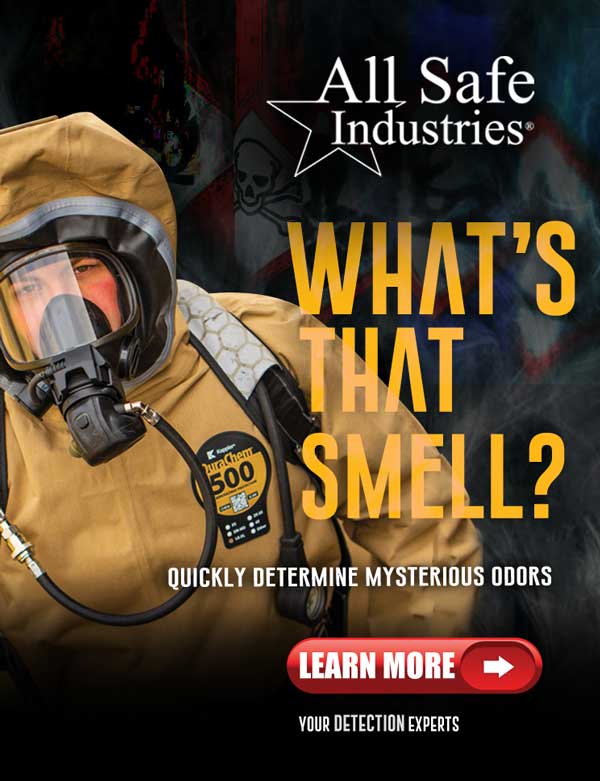Whether it is meeting customers in their stations or at tradeshows, or pouring out some top-shelf bourbon at the Hazmat Nation annual party in Baltimore, Steve Haise is a recognized fixture in hazmat circles. We sat down to ask Haise about the company he started, All Safe Industries, and the hazmat industry.

What inspired your initial idea for All Safe?
After completing my service in the US Navy, I worked for a small start-up company where I started selling safety equipment. That company abruptly went out of business, but the experience inspired me to start my own business. All Safe Industries began in a spare bedroom of my home, and I rented a 10×10 storage unit to use as my first warehouse. I hit the road in Kentucky first, then the surrounding states. I quickly figured out that every city had fire, police, health, water/sewer and public works. All these departments needed safety equipment.
How did that idea evolve into what we see today?
At first, we supplied anything safety, from PPE to traffic control. But changes to the confined space entry standard created a need for new four-gas meters. We began to focus on gas detection, fall protection, ventilation and respiratory equipment. When 9/11 occurred, we shifted our focus to supporting first responders as they geared up for domestic preparedness. Steady growth led us to become a nationwide distributor of technical safety equipment to all types of industries, but especially our first responders.
What did you learn from early failures?
To focus on equipment manufacturers with quality products. One of our early brands started to fail in multiple ways, and we had to pivot to more reliable equipment. Luckily, our customers appreciated the work All Safe Industries was doing as their distributor, and all of them allowed us to replace their instruments with something more reliable.
What have you learned from taking your products into the hazmat market?
It attracts some of the most dedicated people in the fire service. Hazmat techs spend an enormous amount of time gathering intelligence and developing skills through hours and hours of training to hone a skill set required to solve the challenges unique to every incident.
What has been the most profound story you have heard from a customer?
I had a customer call reporting that their SO2 and NH3 sensors were giving readings in an area of the plant where they knew those gases couldn’t be. I researched the technical details of the sensors and noticed both would react to acetylene. I called my customer back and asked what they were doing in that area, and they said cutting with torches. I suggested checking their acetylene lines for a leak, and that was it. Not only did we prevent a possible fire or explosion, but I learned first-hand the value in understanding cross-sensitivities with electro-chemical sensors. The customer was pleased we were able to provide an explanation and help them achieve a safe working environment.
What does the near-term future look like for your company?
All Safe Industries continues to expand our product offering to supply more choice and higher levels of detection technology including the identification of unknown substances. We support our customers in the acquisition of these technologies through service and training resources.
What’s your boldest prediction for All Safe’s future role in hazmat and emergency response?
As technology continues to evolve, I believe autonomous platforms and connected systems will leverage information sharing to provide data to responders at multiple agencies. IT resources and on-demand technical support will be a necessity for technical safety equipment, and All Safe Industries will be committed to supporting our customers.
How do you think buying and selling hazmat equipment will change in the coming years?
My concern is that global companies and venture capital firms will continue to acquire manufacturing companies, then streamline the operation to purely transactional staffing to simply process orders. This will reduce or eliminate knowledgeable resources to call on for technical assistance. I believe independent distributors will become even more valuable sources of information, since they tend to be subject matter experts that focus on niche product segments like hazmat response.
Original post – Copyright © 2023 HazmatNation.com. Externally linked references may hold their own independent copyright not assumed by HazmatNation



